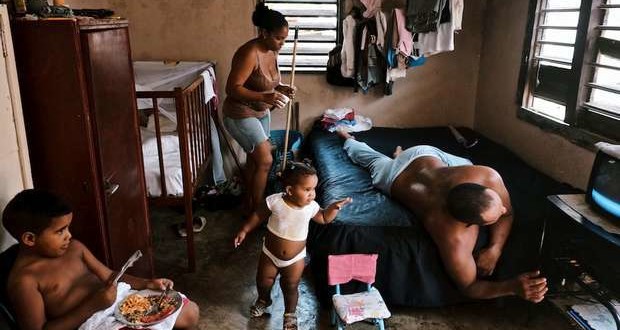
Ivan Garcia, 2 April 2016 — The dilapidated old house where the Varona family lives, in the Lawton district of Havana, could serve very well as a set for a television series about marginalisation and violence.
The front wall cries out for a coat of paint. Cracked roof tiles threaten to fall off. And inside, the house is subdivided into seven small apartments.
Agustín, one of tenants, has an informal business selling building materials. Therefore he has been able to improve his apartment with Italian ceramic floor tiles, build a tiny bathroom with a modern shower and hot and cold running water.
His room has a heavy Samsung Split air conditioner. Opposite the bed is a tiled table with a microwave, induction cooker and a two-door fridge.
The rest of the apartments are absolute ruins, with dirty old beds, but other bedrooms have been treated with grouting. On shelves on the wall, tacky plastic ornaments and empty rum bottles. And, of course, every room secured with bars on the windows and doors.
“It’s to avoid being robbed, which is common here. Hardly anyone speaks to us. Some of them are trying to legalise their place as a separate dwelling. There are various ration books. And when the people come to fumigate the mosquitos it’s a shambles, because not everyone is at home, or they don’t allow them to fumigate. The atmosphere is like a prison, but I’ve got nowhere else to live,” admits Agustín.
Of the sixteen people who live in the house, twelve of them have family ties through their mother or father. The quarrels range from obscene shouting, punch-ups, up to fighting with machetes.
“It’s like a jungle. People get beaten up for anything, because someone has eaten up the bread ration, or stolen a piece of chicken from the fridge,” says Raisa, who lives in this jungle with her husband and daughter.
There are three refrigerators in what was the living room of the house. They all have padlocks, as if they contained valuables. In the neighbourhood they call them Los Muchos. “When they start their fights, you don’t know when they’ll finish. They have set up a protocol in the block. When the insults start, a neighbour informs the police,” a neighbour tells us.
These degrading spectacles form part of the neighbourhood entertainment. “These fights make people want to grab a front-row seat. They are more entertaining than TV soaps, and some fights are more enjoyable than a boxing match programme,” a neighbour told us.
You might think this is an isolated case. It isn’t. Too many Cuban families have split up for silly little things, ideologies or marital conflicts.
When Fidel Castro seized power at gunpoint, a large number of families began to break up. “There were examples of brothers who fought at the Bay of Pigs or in Escambray on different sides. Families who stopped talking to each other, writing or accepting phone calls from family members in Florida just for thinking differently. The government owes a public apology to these broken families,” said Carlos, a sociologist.
For reasons of economic necessity, when they got married, Sergio and Margot agreed to accept money and food and clothing parcels from their daughter Yanira, a prostitute who married an Italian in 1994.
“Before my sister left, my parents broke off contact with her. Then, when she went off to Italy, they said that as far as they were concerned, their daughter was dead. My parents were, and still are, intransigent communists. But, when the ’Special Period’ started, with twelve hours of power cuts and an extreme shortage of food, the old people relented. And now they are living off the euros and things sent them by my sister. She comes every summer and arranges a party in the doorway of the house of the president of the CDR (Committee for the Defence of the Revolution),” explains Ramsés, Yanira’s brother.
The other problem suffered by many families is domestic violence and marital arguments in front of their kids. “Cases of mistreatment of women are frequent. Most of them, because they are ashamed, don’t report them. But I believe that right now, domestic violence is the number one category of crime in Cuba,” said a police inspector in Havana.
These dysfunctional family members are the germ of the perfect storm of the decline of values in Cuba. Until the autocrat Raúl Castro launches a crusade to end it. They run from, for example, vulgar speech, bad manners and lack of courtesy, up to drunks boozing on street corners and then urinating in the street.
For the sociologist Carlos, this degradation “is a terrible anthropological damage. Developing the economy and rebuilding the country should be simpler. But poor education, violence and lack of respect for your neighbour’s private space will be difficult to remedy.”
And it is not the fault of the US embargo.
Appeared in: Hispanopost, 30 de marzo de 2016.
Translated by GH
